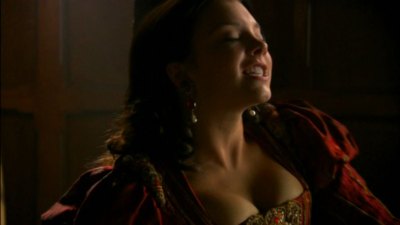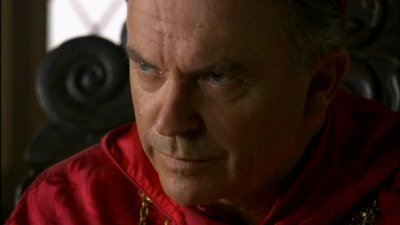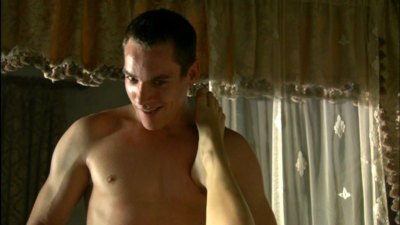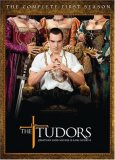| Reviews & Columns |
|
Reviews DVD TV on DVD Blu-ray 4K UHD International DVDs In Theaters Reviews by Studio Video Games Features Collector Series DVDs Easter Egg Database Interviews DVD Talk Radio Feature Articles Columns Anime Talk DVD Savant Horror DVDs The M.O.D. Squad Art House HD Talk Silent DVD
|
DVD Talk Forum |
|
|
| Resources |
|
DVD Price Search Customer Service #'s RCE Info Links |
|
Columns
|
|
|
Tudors - The Complete First Season, The
Hoping to capture some of the critical laurels of HBO's lavish period-piece Rome (while garnering the buzz and ratings of HBO's iconic The Sopranos), Showtime premiered The Tudors last April, a lusty, fast-moving 10-part series detailing the sexual and political escapades of 16th century England's Henry VIII. Re-imagined from the traditional movie representations of Henry (think portly and imperious) as a whipcord thin, fiercely emotional monarch, the Henry of The Tudors preens and struts about the luxurious sets like a rapacious punk rocker, with shorn hair and various leather get-ups that emphasis is outre sexuality. Deliberately designed as a soap opera for grown-ups, The Tudors works well as TV eye candy, providing plenty of nefarious, double-dealing subplots and tons of cable-ready sex, fitted into a souped-up, historically suspect framework. And on that level, it succeeds quite well. But those looking for anything other than surface characterizations and the thinnest of motivations will find The Tudors a pretty, but empty, vessel.

Henry VIII has always been a reliable movie subject because writers see within the monarch's real-life lusts and passions, a seemingly inexhaustible supply of anecdotes and scenes that make for exciting drama. And The Tudors is no different. Even if you don't have the faintest idea of English lines of kingly and queenly successions (I know I took it in college, but quite honestly, it's all a blur now), most of us know Henry VIII and his pursuit of the comely Anne Boleyn - while still married to the inconvenient Catherine of Aragon, the former wife of Henry's brother Arthur. In a word, it's a "natural" for the screen. A romance that could be labeled coarse melodrama in a purely fictitious work, is given the sheen of "worthiness" due to its historical importance (England's break from the Catholic Church was driven by many factors, but none more directly than by Henry's battles with the church over his divorce).
The Tudors, quite unabashedly, pulls out the sexual elements of this historical story, and frames the entire miniseries around this sensuous theme (violence, curiously, is largely left out here). The creator and writer of the series, Michael Hirst (Elizabeth: The Golden Age), has stated in interviews that he looked to American soaps like Dallas and Dynasty, as well as The Sopranos, to figure out how to structure The Tudors for television. And certainly, stylistic elements of both of those disparate forms of television serial show up here, from the elaborate tit-for-tat pacing of the various family squabbles and revenges perpetrated by the attractive cast (Dallas, most certainly), to the notion of corruption, both personal and cultural, infusing relationships and superceding any higher emotions, with the deleterious effects felt for years and years afterwards (The Sopranos).
If you caught the Showtime promos for this series, the links with the American prime-time soaps was pronounced, and on that pulpy, entertaining level, The Tudors closely follows the Dallas model. This is melodrama, pure and simple, with a goal of giving the audience vicarious thrills as we watch powerful people act like power-hungry, money-grasping, sex-obsessed humping animals. And for the most part, The Tudors is quite good at delivering the goods. Attractive, accomplished actors engage in suitably modern cable sex at the drop of the hat (at least one or two R-rated sex scenes per episode), while the political, religious, and romantic subplots, simplified and reshuffled from the historic record for dramatic convenience, simmer and boil in the background.

But for all the mentions of The Sopranos by the writer, producers, and by Showtime, The Tudors doesn't come close to that morally ambiguous, narratively complex drama. For all its re-imagining into a 21st century cable TV drama, including making Henry young and sexy, and throwing out a lot of creative additions to the real history, The Tudors finally comes out thoroughly conventional, in design and execution. The main problem with The Tudors is the fact that we never really get any context for the actions whizzing by on the screen. Who, exactly, is Henry VIII here? We hear him embrace "humanism" (but we never hear a discussion of what that concept is, or what it means to him); we hear him embrace the "Church" (but we never get a sense of what that "Church" means to England, in any historical context); we hear him gradually denounce the "Church" (but we never get an adequate sense of what opposing tenet now enthralls him); and most importantly, we see him pursue, with increasing disregard for logic and political expediency, Anne Boleyn (but we never understand what it is about Anne that makes Henry so crazy for her).
Why does Henry find Anne Boleyn so indispensable to his daily life? Watching The Tudors, we may just conclude it was sex alone that drove the monarch mad with unquenched lust. Certainly Natalie Dormer, the elfish, minx-eyed brunette with the heaving decolletage who plays Anne, is intriguingly erotic enough to confirm that notion with most viewers. But was that really all that Henry found arresting about her? That he couldn't have her sexually until he was divorced? The Tudors, in typically unfocused fashion, can't make up its mind as to whether or not Anne really loves Henry at this point in their relationship (the series ends before their eventual marriage), or whether she's simply a stooge for her father Thomas Boleyn (Nick Dunning), who had earlier pimped out his older daughter to the king, in exchange for political and monetary gain. If the series won't take a stand on what guides Anne's actions, and if the character of Henry isn't even scratched in terms of motivation, other than a Cliff Notes litany of historical guideposts (through no fault of the mesmerizing Jonathan Rhys Meyers, whose performance is the best thing in the series), we're left with a very pretty Avon Books historical romance novel, brought to life - and nothing more.
Not even the usually accomplished Sam Neill can pull out a save with his calculating Cardinal Wolsey impersonation, which is central to the main story arc in this first season (the series has already been renewed for a second go-around). Is Wolsey evil? Is he kind? Does he truly love and support the king, or is he an opportunist, manipulating the king to make himself Pope? The Tudors won't tell you. It wants to have it all ways with the character, and thus, leaves us hanging (the character's final scene, where he commits suicide - which is historical bunk, by the way - literally has Wolsey telling the viewer even he doesn't know who he is). The Sopranos may have benefitted from a post-modern ambivalence in character motivation and plotting (although that series' finale would suggest that tactic was taken a step too far), but The Tudors' studied vagueness ultimately doesn't impart artistic depth, but rather a flashy, shallow "existential gilt" applied to a thoroughly conventional - but nonetheless enjoyable - soap opera.

Here are the 10, one-hour episodes of the four-disc box set The Tudors: The Complete First Season, as described on their slimcases:
DISC ONE:
Episode 1
King Henry VIII, the young and ambitious monarch of England, prepares for war with France but is dissuaded by the diplomatic manipulation of his powerful Lord Chancellor, Cardinal Wolsey, who proposes that the King sponsor a "Treaty of Universal Peace." The harmony of the King's domestic affairs is threatened, however, when he discovers that Elizabeth Blunt, the young and beautiful lady-in-waiting to his Queen, Katherine of Aragon, is pregnant with his child.
Episode 2
Allegiances shift at home and abroad. Despite extravagant claims of loyalty to France during the "Field of Cloth of Gold" ceremonies, Henry contemplates an alliance with Charles V, King of Spain, who was recently named Holy Roman Emperor. Because he is dependent on the support of the French cardinals, Wolsey's chance to become Pope is threatened. A gift of Machiavelli's The Prince makes Henry wonder if it is better asking to be loved or feared. For now, he sets about achieving both. He executes the scheming Duke of Buckingham for treason and celebrates the birth - by Lady Elizabeth Blount - of a first healthy baby son, whom he names Henry Fitzroy.
Episode 3
A new and important ally sweeps into Henry's court in the form of Charles V, the most powerful man in Europe and nephew to Henry's wife, Katharine of Aragon. To protect the very significant alliance he hopes will aid in his bid for an English role in European affairs, the King is careful not to reveal to Charles the growing distance between himself and the Queen. However, affairs of the heart are more likely to unsettle Henry's resolve as he comes face-to-face for the first time with the beautiful Anne Boleyn. Unbeknownst to the King, he is being seduced by forces more calculating than any young woman.
DISC TWO:
Episode 4
While Henry is named "Defender of the Faith" by a Pope grateful for his spiritual and political loyalty, fidelity is scarce in Henry's court. His sister, Princess Margaret, marries the decrepit King of Portugal, only to murder him soon after and returns to the lustful arms of Charles Brandon. The Duke of Norfolk and Sir Thomas Boleyn continue to conspire against Cardinal Wolsey. And the King grows ever more enamored of Anne Boleyn. His increasing disinterest in his Queen, and the realization that he still hasn't produced a legitimate heir to the Tudor dynasty, conjure an urgent desire for radical action.
Episode 5
Henry is king of passion and perseverance. Efforts at alliances - both personal and political - face setbacks, but the King remains undeterred. When his ally, Emperor Charles V, releases Francis I, their mutual enemy, from prison, he is stunned - but resolves to redirect his European ambitions. And when Anne Boleyn is insulted by his offer to make her his sole and unique mistress, it merely redoubles his passion and resolve to one day marry her. However, his separation from the most powerful political figure in Europe may prove easier to affect than an annulment from his wife.
Episode 6
Personal and political allegiances continue to change in Henry's court. The King grows ever more confident in his role as monarch and more enamored of the young Anne Boleyn. Despite Cardinal Wolsey's influence and efforts - and much to the frustration of the King - the Catholic Church seems unable to make progress in Henry's petition for a divorce. This adds to the growing discomfort of the increasingly vulnerable Wolsey.
DISC THREE:
Episode 7 (incorrectly labeled as appearing on Disc Two)
Dark days for Tudor England. The mysterious sweating sickness, almost always fatal to those who catch it, runs rampant. A food shortage adds to the suffering. Henry's natural optimism and energy take a beating as the King's confidence gives way to doubt and delusions. But after darkness comes light. The plague begins to disappear and the King receives news that his mistress, Anne Boleyn, has miraculously survived. Even better, an envoy of Pope Clement is on his way to England to finally convene a court which will decide on Henry's request for a divorce.
Episode 8
Pope Clement's special envoy arrives in London to oversee the court deciding upon the legitimacy of Henry's marriage to Katherine of Aragon. The findings of this trial will have far-reaching consequences: the future of the King's amorous relationship with Anne Boleyn, Cardinal Wolsey's career and influence, and England's relationship with Rome all hang in the balance.
Episode 9
Cardinal Wolsey's fall is quick and pitiless. Stripped of office and authority, he is banished from the court and sent far from his much-beloved King. His unlikely successor is Sir Thomas More, a man unlike the overbearing Wolsey in every way but one - his loyalty to Henry.
DISC FOUR:
Episode 10
Cardinal Wolsey is down but not yet out. Although exiled, he tries to gather last-minute support from his old enemy, Queen Katherine. She hesitantly agrees to his plan, as she finds herself in a situation similar to that of the fallen Cardinal. But their plot is intercepted by the King's new advisors and Wolsey must pay the ultimate price.

The DVD:
The Video:
While it's obvious that the look of The Tudors is rich and glossy, I was surprised at the occasional compression issues, including pixilation and cubing, that occurred from time to time in this anamorphically enhanced, 1.78:1 widescreen transfer. Other than that drawback, The Tudors' picture is bright, correctly hued, and in general, sharp.
The Audio:
The Dolby Digital English 5.1 Surround audio mix is robust and cleanly delineated; a serviceable 2.0 is also available. There's a Spanish mono track, along with English close-captions.
The Extras:
There are a few short bonus features included on The Tudors: The Complete First Season. Production Design, running 4:07, looks at the artistry involved in recreating the look of Tudor England. Costume Design, running 5:09, looks at the creative modernizing of costumes created for the series. Tudor Historical Sites, running 22:29, features a fascinating tour of various Tudor sites in London. Text biographies are included for the cast, as well as a photo gallery. And if you choose to watch The Tudors: The Complete First Season on your computer, you can access episodes of This American Life, Californication, and Penn & Teller Bullsh@t.
Final Thoughts:
Tired of flipping through your wife's soft-core romance novels for a jolt? Tune in then to The Tudors: The Complete First Season, a rowdy, lusty rollick in the medieval hay with the over-sexualized, re-imagined rock star King Henry VIII. There are plenty of bawdy mountings and scene-chewing by the excellent cast as the fleshy melodramatic subplots whiz by with nary a breather. Just don't expect fully-rounded characters, or context for their ribald, earthy machinations. I recommend The Tudors: The Complete First Season.
Paul Mavis is an internationally published film and television historian, a member of the Online Film Critics Society, and the author of The Espionage Filmography.


|
| Popular Reviews |
| Sponsored Links |
|
|
| Sponsored Links |
|
|
| Release List | Reviews | Shop | Newsletter | Forum | DVD Giveaways | Blu-Ray | Advertise |
|
Copyright 2024 DVDTalk.com All Rights Reserved. Legal Info, Privacy Policy, Terms of Use,
Manage Preferences,
Your Privacy Choices | |||||||















